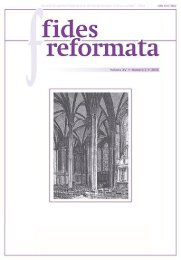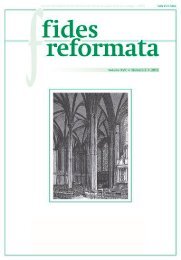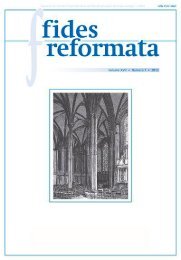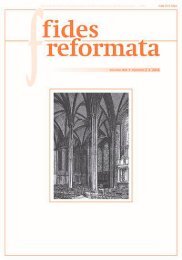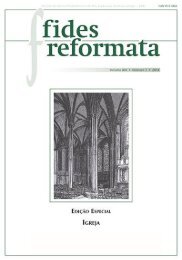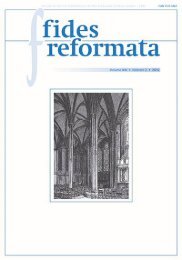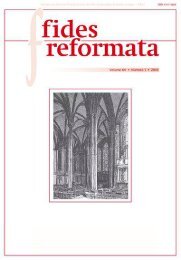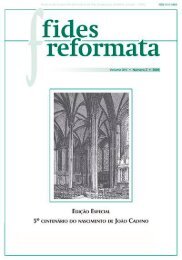Fides 18 N2 - Revista do Centro Presbiteriano Andrew Jumper
Revista Fides Reformata 18 N2 (2013)
Revista Fides Reformata 18 N2 (2013)
You also want an ePaper? Increase the reach of your titles
YUMPU automatically turns print PDFs into web optimized ePapers that Google loves.
Paulo Afonso Nascimento Castelo, Jonathan Edwards e o Livre-Arbítrio<br />
Também cremos que essa obra traz muitas reflexões que servem de refutação<br />
àqueles em nossas igrejas que defendem um arbítrio absolutamente<br />
livre e independente. Há alguns argumentos <strong>do</strong>s que defendem uma suposta<br />
liberdade da vontade que beiram ao absur<strong>do</strong>, como bem considera Edwards.<br />
Quanto ao impasse que se apresenta no pensamento de Edwards e que<br />
torna Deus autor <strong>do</strong> peca<strong>do</strong>, a bem da verdade nem arminianos e nem calvinistas<br />
conseguem se posicionar de forma adequada e inatacável sobre este assunto.<br />
Assim, sobre esse tema achamos bastante aceitável a<strong>do</strong>tar a posição da<br />
Confissão Belga, de 1561, 38 no artigo 13, sobre a providência divina. Ao sustentar<br />
que Deus não é autor e nem pode ser acusa<strong>do</strong> <strong>do</strong>s peca<strong>do</strong>s que são cometi<strong>do</strong>s,<br />
ela afirma: “E não queremos investigar curiosamente as obras dele (que<br />
ultrapassam o entendimento humano) além da nossa capacidade de entender”.<br />
Quanto ao fato de estar Edwards estritamente liga<strong>do</strong> à tradição reformada<br />
ou não, devemos lembrar que somente as Escrituras são inerrantes e infalíveis.<br />
Não o são os primeiros reforma<strong>do</strong>res e nem as confissões de fé. Há então lugar<br />
para uma análise da posição de Edwards frente à Orto<strong>do</strong>xia Reformada e, a<br />
partir daí, então, que se a<strong>do</strong>te a posição mais coerente com as Escrituras. Assim,<br />
concluímos que é de bom siso que qualquer um ao sustentar posições quanto à<br />
vontade humana no meio evangélico deva ter Edwards como leitura essencial.<br />
abstract<br />
Jonathan Edwards is among the great Christian thinkers in history. His<br />
concepts, resulting from a lifetime of study and reflection, deserve the careful<br />
consideration of every Christian. This article intends to offer a brief analysis<br />
of his though on human will. Edwards’ main objective in his writings dealing<br />
with this subject was to refute Arminianism and its defense of free will, which<br />
was gaining strength in the evangelical circles of that time. Edwards did this<br />
from the perspective of Reformed ortho<strong>do</strong>xy, but he also dialogued with some<br />
philosophical principles then flourishing. Such approach is laudable and certainly<br />
necessary today for those who want to be relevant to their generation. The<br />
article presents Edwards’ main arguments in two of his works, The Free<strong>do</strong>m<br />
of the Will and Original Sin. It also surveys the main controversies that even<br />
in our day revolve around the theologian’s thought on will: whether his reflection<br />
on the theme is compatible with that of the first reformers and whether<br />
the Edwardsean propositions make God the author of sin. We conclude that,<br />
despite some unsolved issues in Edwards’ thought, his reasoning on human<br />
will are necessary in our time, when many church members have biblically<br />
mistaken concepts about will and free<strong>do</strong>m.<br />
keywords<br />
Jonathan Edwards; Free will; Will; Determinism.<br />
38 Ibid., p. 40.<br />
74





